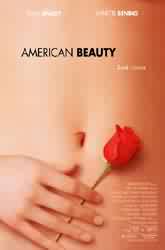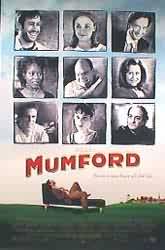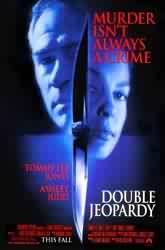 |
American Beauty (Dir: Sam Mendes, Starring Kevin Spacey, Annette Bening, Thora Birch, Wes Bentley, Mena Suvari, Chris Cooper, Peter Gallagher, Scott Bakula, Sam Robards, and Allison Janney) more BY: DAVID PERRY |
| Cinema-Scene.com > Volume 1 > Number 30 |
Cinema-Scene.com
Volume 1, Number 30
 |
American Beauty (Dir: Sam Mendes, Starring Kevin Spacey, Annette Bening, Thora Birch, Wes Bentley, Mena Suvari, Chris Cooper, Peter Gallagher, Scott Bakula, Sam Robards, and Allison Janney) more BY: DAVID PERRY |
I'm not the sentimental type, so it is quite the rarity that I am truly touched by a film. When most moviegoers are having epiphany moments at Good Will Hunting and Patch Adams, I'm always singing the praises of some cynical film that is as far from life affirming as films can get (I was an advocate for Happiness when Patch Adams came out!). So for me to find a film to be both beautiful and redeeming in my mind, it must be quite the film. Earlier this year, I spent hours telling of the great films Eyes Wide Shut, The Red Violin, eXistenZ, and The Matrix, none of which have any sentiment or touching moments to speak of. But my wait for the touching film of 1999 has finally come to an end. Joining the annals of The Deer Hunter, Schindler's List, The Sweet Hereafter, Life is Beautiful, and Fargo is American Beauty. Few films pick up raw emotions from me like this film. I have sit through some of the worst dreck this year, and I'd say that all the She's All That's and Wing Commander's in the world are worth it just to see a film like this one.
1999 has a listing of films from major directors this winter stronger than any previous year I can remember. Names like Martin Scorsese, Roman Polanski, Werner Herzog, and Paul Thomas Anderson have something to throw at me in upcoming months, but it almost looks like they may actually be one-upped by a first time film director, whose only previous work has been on Broadway. The Blue Room and Cabaret revival director Sam Mendes shows more directorial prowess than any name I've been present to this year, and this is the year I saw a Kubrick film! He has taken all his knowledge of Broadway direction and brought it to the screen without making the film seem staged or static, achievements only below Elia Kazan's A Streetcar Named Desire and Sidney Lumet's A Long Day's Journey Into Night. The beautiful cinematography by recent Academy Award nominee Conrad L. Hall transcends the spectrum of light and shadow making scenes come off with more emotional pull than entire Spielberg films (a scene in which Annette Bening emotionally breaks down in a dark room before walking into a single light for less than a second is film cinematique at its best). Mendes and Hall have made what could be considered the greatest achievement for dramatic filmmakers, bringing the audience into the characters with simple camera work.
Despite my adoration for the two men behind the camera here, proper kudos should be given to the cast. Smaller players like Scott Bakula, Allison Janney, and Peter Gallagher give support to the leads and supporting actors that are immeasurably important. Kevin Spacey's performance as Lester Burnham, a man going through the ultimate midlife crisis in his hectic suburban experience, is the best performance I have seen all year. Spacey is in top form and continues to grow the admiration I have had for him since his three star making films in 1995 (Se7en, Swimming with Sharks, and The Usual Suspects). His bitingly satirical character is just what I wanted from an actor this year and he delivers, and then some. If he does not get a best actor nomination at this year's Academy Awards, I will all but disown the ceremony all together. His admirable performance could overshadow any other actors' performance in most films, but here he is joined by established and new actors and actresses, all making themselves quite a mark on film here. The Annette Bening performance as Spacey's closeted manic-depressed wife is, to the best of my recollection, the best female performance I have seen in twenty years, even surpassing Mary Tyler Moore's paralleled job in Ordinary People. Bening does more here than I have ever seen from the actress, and my profound respect for her has grown considerably.
The film is still held up from the back as its younger and less established actors make a mark that is rare from young Hollywood these days (the cast of Dawson's Creek, take note). I was somewhat acquainted with Thora Birch, having seen her grow up in films for a few years now, doing horrible films like Now and Again, Hocus Pocus, and Monkey Trouble. As Lester's daughter Jane, she gives a terrific dramatic performance that would leave even the greatest of child actor cynics blown-away. Also of the better known bunch is Mena Suvari, co-star of the similarly titled yet far inferior American Pie, as Jane's friend whom Lester dreams of sexually and begins his midlife crisis in the thought that he might get her. I was less than enthused by her performance in American Pie, but the one she puts forth in American Beauty is almost of a different actress. Whatever acting lessons she went through between projects has to be the best education money can buy. Despite these two females I had heard of, I was more blown away from the guy I had never heard of. As the neighbor obsessed with Jane and closest friend of Lester, Wes Bentley looks to be the next under appreciated young actor. Like Tobey Maguire, Bentley gives the dramatic performance that Freddie Prinze Jr. could doubtfully even dream of. In his expressions, there is more feeling and character than in Patch Adams as a whole. Bentley gives the type of performances I only see every once in a while. Names like Jodie Foster in Taxi Driver, Jeff Bridges in The Last Picture Show, Timothy Hutton in Ordinary People, Tobey Maguire in The Ice Storm, Anna Paquin in The Piano, and Tatum O'Neal in Paper Moon, actors and actresses that gave dynamic performances in the realm of Olivier and Rains, without having even reached their twenty-fifth birthday, now have the addition of Wes Bentley in American Beauty.
I'm not the one to put things on the line like I'm about
to do, but I'd dare say that I will not see a better film this year than American
Beauty.


| BUY THIS FILM'S FROM AMAZON.COM |
REVIEWS OF THIS FILM |
 |
Mumford (Dir: Lawrence Kasdan, Starring Loren Dean, Hope Davis, Jason Lee, Alfre Woodard, David Paymer, Jane Adams, Mary McDonnell, Dana Ivey, Kevin Tighe, Zooey Deschanel, Ted Danson, Martin Short, Pruitt Taylor Vince, and Robert Stack) more BY: DAVID PERRY |
Film director Lawrence Kasdan is one of the more beloved directors to most people, with the exception of maybe me. He is considered one of the greatest modern American directors, and I just do not see it. I'm out singing the praises of David Fincher, David Cronenberg, Todd Solondz and other more unusual directors, leaving people like Kasdan seeming very static and uninteresting. His films are just a walk through the park to me and I'm never really left with any feeling or interest in anything he tried to tell me. I have only twice given a Kasdan film a recommendation, in 1983 with the just okay The Big Chill and in 1988 with the overrated The Accidental Tourist. I thought that The Big Chill was a nice little story, but nothing to write home about and that The Accidental Tourist was light and billowy, but still not anything like Oscar material (much the same way I felt recently with James L. Brooks' As Good As It Gets). One can say that Lawrence Kasdan and I have the exact same relationship as I have with Robert Altman and Francis Ford Coppola (though I would say that the prestige for those two are much higher than Kasdan's). If you ask me, it is Kasdan's son Jake that really deserves my time. Though having only done one film, Jake Kasdan has proven himself a better director than his dad with the terrific The Zero Effect from two years ago.
Despite all this, I'll be first to admit when someone surprises me (remember my change of heart with Devon Sawa after S.L.C. Punk! and Idle Hands) and Kasdan has somewhat surprised me. His new film Mumford is the light and affectionate film that I'd usually find cloying but at least this time it has a darker and cynical side. The whole ideology of the film is not necessarily 'love conquers all,' but the moral seems to be 'lie well and you'll get what you want.' Mumford is about a man named Mumford (Dean) that moves to a town named Mumford to start a psycho-analysis practice. The townspeople open up to him and he begins to have more patients than the two other psychologists (Adams and Paymer) combined. Everyone seems to like him and friends come quick to him, but there is one small problem: he is not really a psychologist. Everything from the name to the certificates on his walls are fake and he is making a nice wage doing an occupation he is good at, though not certified to do it. He starts two relationships with clients, one as a friend, one as a hopeful lover. The friend is a local skateboarder that has made a fortune as the manufacturer of modems named Skip Skipperton (Lee). When he confides in Mumford, he often finds Mumford simply telling him the secrets of his other patients, finally telling him the truth about his past. The hopeful lover is the closet-case Sofie (Davis) that lives with her parents and is only seeing him because her father is making her.
Mumford is a likable film, but less than
great. I enjoyed the performers and I liked most of the scenarios, but the film does
not always succeed. Considering that it is supposed to be a comedy, I was surprised
at just how little I laughed. There were funny moments, but there were also moments
where I just sat there scratching my head at what importance a scene was to the film and
how off-kilter parts were (the stand-out scene of thus would be when Mumford recounts his
past with drugs, the IRS, and monks). The normally literal Kasdan has some scenes that did
stand out like the occasional dramatizations of a patient's soft-core pornographic
dreams. No matter how I felt about Mumford, I still think that Kasdan has
little else up his sleeve for the future.

 |
Dog Park (Dir: Bruce McCulloch, Starring Luke Wilson, Natasha Henstridge, Janna Garofalo, Bruce McCulloch, Kathleen Robertson, Kristin Lehman, Amie Carey, Gordon Currie, Harland Williams, Mark McKinney, and Jerry Schaeffer) more BY: DAVID PERRY |
It was just two weeks ago that I had the chance to attest my adoration for the actor Luke Wilson with his appearance in Blue Streak. Though a supporting role, he went beyond the lead and stole all of his scenes. That left me thinking of how great he would be in a lead role. The closest to that was last year in the film Home Fries, in which he was the second lead under Drew Barrymore. The film was good and showed a nice side of the actor, but its lack of an audience and less than enthralling ad campaign left many unaware of Wilson. It is sad in my mind that his inferior brother Owen has been able to pick up an audience by appearing in films like The Haunting and Armageddon (though to his credit, Owen did pen Rushmore with director Wes Anderson). The idea that Dog Park might be the chance for Luke Wilson to shine in a lead role brought me in the theatre, too bad that was just barely enough to keep me in.
Dog Park is about two people that have had long lasting relationships come to a close and now they are brought together by the fact that they both love their dogs. Set in and around a New York dog park, the film's two leads are lucky to meet each other for the first time in a bar (quite hard to swallow considering that both are taking their dogs to the same obedience school regularly). Andy (Wilson) is a writer for a magazine whose girlfriend has taken everything including his prized pooch; Lorna (Henstridge) is the host of a small children's program about reading, whose boyfriend has left her for none other than Wilson's ex. Both are a little uncertain about their relationship, but they grow to love each other while dealing with their dogs. At the same time is the subplot of Wilson's best friend (Garofalo) finding out that her husband (director McColloch) is having an affair with Henstridge's best friend.
The film is an all-out bore, with little chemistry
between the leads. I was sitting contently waiting the film to end so that I could
go see American Beauty again. Wilson and Henstridge both try, but neither
succeed in making their characters interesting or even interested in each other to the
point that anything is believable. Bruce McColloch has been enjoyable before on the
Canadian sketch comedy series The Kids in the Hall, but nothing in this film has
the energy or hilarity of the show. In the realm of light romantic comedies, Dog
Park is one of the worst.

 |
Double Jeopardy (Dir: Bruce Beresford, Starring Ashley Judd, Tommy Lee Jones, Bruce Greenwood, Annabeth Gist, Roma Maffia, Davenia Brazeau, Gillian Barber, and Benjamin Weir) more BY: DAVID PERRY |
It seems that there are generally quite a few directors that shame themselves on a yearly basis. Remember David Lynch's Lost Highway, Francis Ford Coppola's Jack, and Michael Cimino's Desperate Hours, and Oliver Stone's U Turn? Still I keep on thinking that these names will still surprise me occasionally, but that is not how it is with Bruce Beresford. He made great films like Breaker Morant, Tender Mercies, and Driving Mrs. Daisy, but then he made some atrocities like King David, A Good Man in Africa, and Last Dance. Beresford has only shone when paired with a good cinematographer like Russell Boyd. I think I need not say that I was not expecting much from this new film from Beresford. Though the idea sounded interesting, it looked way too much like a sequel to US Marshals. So the rating I give for Double Jeopardy, though not very high, is better than I thought I'd be giving it.
Double Jeopardy is your normal chase thriller in which a wronged man (in this case a wronged woman) must get free of the police and save their name of the crime they are accused of. Done numerous times by Alfred Hitchcock perfectly, Beresford fails at properly directing this story. There were a few moments of slight levity that I thought really worked, but most of the so-called suspenseful moments were far from that and the sappiness of the story nearly killed me. It is a true crowd pleaser, including the crowd at the screening I was present to. At one point Beresford shows a picture of a small child for sentimental reasons, and the crowd went into "aww's" and "isn't he cute?"s. Beresford's attempts to direct the film like he is doing a riff on The Fugitive with the sensibilities of Driving Miss Daisy. Sure the Daisy thing worked for him once, but it would have been different if Morgan Freeman was a police officer chasing down Jessica Tandy, who has been accused of driving over pedestrians.
Libby Parsons (Judd) is the upper-middle class wife of an art collector and all-around good guy Nick (Greenwood). They seem to be a happy couple with a loving son (Weir) and a seemingly over affectionate best friend (Gish) on a nice little voyage on a sail boat. Then in the night, Libby awakens to find the boat drenched in blood and her husband gone without a trace. The coast guard brings her in and next thing Libby knows she is on trial for murdering Nick. After being sent to prison for murder, it becomes clear to her that Nick is still alive and has taken their friend and son in a new life. In prison she befriends an ex-lawyer that tells Libby of double jeopardy. It seems that if it is true that Nick is still alive, she can kill him and not have to be tried for it having already been tried and convicted for killing him. When released on parole after six years, Libby is sent to a home for women on parole that is headed by Travis Lehman (Jones). After a few events occur, Lehman finds himself on the trail of Libby as she searches for the husband she must kill and the son she must reclaim.
I liked the whole premise, but noticed the many
improbabilities of it. Did screenwriters David Weisberg and Douglas Cook never hear of the
writ of habeas corpus, where no one can be tried for murder without a body? Evidently not,
or else I'm misunderstanding it. All the actors give willing turns to the camera,
but only Greenwood comes off well. Judd and Jones both seem to be sitting through
this waiting for a nice paycheck. I did like the whole idea of the film and I even
thought the climax was not too bad, but the ending was one of the worst of the year.
Double Jeopardy is one of the more flawed films this year, but still an admirable
attempt from a director that deserved so much contempt.

Reviews by:
David Perry
©1999, Cinema-Scene.com
http://www.cinema-scene.com